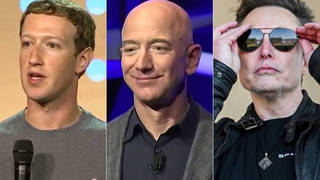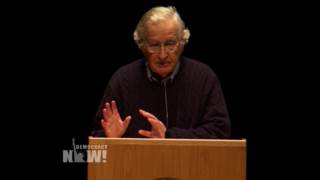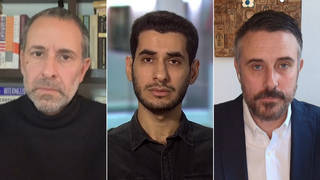
Related
On this Super Tuesday in Georgia, one issue where the Republican candidates fully agree with President Obama is nuclear power. The nation’s first reactors since 1978 recently won federal approval. Atlanta-based Southern Company is attempting to build two new reactors at the Vogtle plant in eastern Georgia. We speak with Stephen Smith of the Southern Alliance for Clean Energy, one of nine groups seeking to block the project, who notes that nuclear power plants rely on federal loan guarantees because Wall Street is not interested in investing. “You would think that the conservative party would be conservatively approaching use of both ratepayer money and taxpayer money and that they would want transparency and openness,” Smith says. “Yet we’ve heard virtually nothing from anyone in the Republican Party.” [includes rush transcript]
Transcript
AMY GOODMAN: We continue to look at Georgia, one of 10 states voting in today’s Republican “Super Tuesday” contests. Few people know that Georgia is the site of one of the most critical fights over nuclear power in the United States today. Just last month, the Nuclear Regulatory Commission approved the country’s first new nuclear reactors since 1978. The Atlanta-based Southern Company is attempting to build two new reactors at the Vogtle plant near Waynesboro in eastern Georgia, near the South Carolina border.
In a shocking development, the vote was not unanimous, with the NRC chair, Gregory Jaczko, casting the sole dissenting vote. He said he had objected to the licenses over the absence of guarantees to implement recommendations made following the Fukushima nuclear disaster in Japan last year. At the time, Jaczko had said, quote, “I cannot support issuing this license as if Fukushima never happened.” Well, Sunday marks the Fukushima disaster’s one-year anniversary. A coalition of anti-nuclear groups has since filed a lawsuit seeking to block the Southern Company project.
I’m joined now by the executive director of one of the nine groups taking part in the suit. Stephen Smith is with the Southern Alliance for Clean Energy in Atlanta.
Welcome to Democracy Now! Talk about how these plants are coming into being, if—unless you can help it and stop it.
STEPHEN SMITH: Well, thank you for the opportunity to comment.
Southern Company and Georgia Power, particularly, are very aggressive in wanting to pursue this technology. And we believe that they could not do it if it weren’t for a number of things that they’ve done to distort the market forces that would, I think, prevent nuclear power. They’ve gotten early cost recovery, meaning the rate payers are coming forward and having to pay early, even though the plant may not ever be completed. They’ve asked now the federal government for loan guarantees to support the project, and they have not revealed the terms of that loan guarantee. And they have both the legislature and the regulatory Public Service Commission very strongly on their side, pushing this project. And that is—that is what is really the momentum behind it.
AMY GOODMAN: Explain the position of President Obama when it comes to nuclear power, and why it—you need the approval, basically. I mean, President Obama, coming forward to say he supports the construction of these plants, has announced it in his State of the Union address.
STEPHEN SMITH: Well, there’s a couple things going on there. First of all, nuclear power is not viable if it wasn’t for all types of subsidies and support, and the federal government has to play a critical role in that. These loan guarantees are meant to, in essence, buy down the risk for the company, because Wall Street doesn’t want to invest in these because they’re extraordinarily long-range investments, take multiple years to build. There’s a lot of uncertainty with cost overruns and delays in schedule. And so, from a Wall Street perspective, they’re really not a good investment. But the federal government uses taxpayer support, in essence, to prop up and buy down the risk for the construction for these plants.
The President, even going back to when he was a senator, has been generally supportive of nuclear power, and he has played the same game that some members of the Republican Party are doing about — “Well, we’re all for all of the above,” meaning they want to support all kinds of energy technologies. Unfortunately, nuclear power is so extraordinarily expensive that it really takes the oxygen out of the room for a lot of other things, like investments in energy efficiency, and it ends up taking money that could be invested in cleaner, safe technologies and diverts that into these massive projects that are pretty much geared primarily to support the shareholders of the company and make sure that they’re assured profits, because the risks are being shifted away from the shareholders of Southern Company as an investor-owned utility onto the ratepayers and the taxpayers of this country. So, in essence, it’s socializing the risk and privatizing the profits.
AMY GOODMAN: Has this become an issue, Stephen Smith, in the Republican primary in Georgia, the voting taking place today? I mean, presumably, with the concern of the increase of the debt, of larger government, which this certainly involves, this would become a major issue that the Republicans would be against.
STEPHEN SMITH: Well, you would think so, if they were consistent. And you would also think so, if they were tracking their at least verbal commitment to market forces. But the reality is there’s a great inconsistency in the Republican Party, because nuclear power is very much subsidized by the federal government. It can’t compete in the market. It’s not really supported by Wall Street. Yet it has become a Republican talking point in a very dramatic way, and it made it a very partisan. So it’s very difficult for Republicans to speak out against nuclear power because it’s become just, in essence, a plank of their support. And that’s unfortunate, because there—you would think that the conservative party would be conservatively approaching the use of both ratepayer money and taxpayer money and that they would want transparency and openness. One of the starkest examples is, the Republicans have been very aggressive in pursuing loan guarantees around the Solyndra failure and using that to sort of beat up on the administration, yet the loan guarantee with this nuclear power plant is many times larger, and yet we’ve heard virtually nothing from anyone in the Republican Party about looking out for taxpayer interests and whether this is actually a greater risk.
AMY GOODMAN: Newt Gingrich, from Georgia, and who’s expected possibly to win the Georgia primary today?
STEPHEN SMITH: Well, again, we have not seen any significant verbalization by the—any of the Republican candidates on this. And if you look at their talking points, you know, it’s—and their platforms on energy, they’re very much about drilling and nuclear power as their solution to everything that ails the country.
AMY GOODMAN: Is there a possibility that these plants can be stopped, Stephen?
STEPHEN SMITH: Well, there’s a very long way to go here. I mean, first of all, as you mentioned, we are just coming up on the year anniversary of the tragedy in Japan. And let’s recount what happened there. You had multiple nuclear reactors that were literally out of control, spewing radioactivity into the ocean and into the countryside. And this is something that if you had talked to—again, Japan is a very industrialized nation. If you had talked to the engineers the day before this happened, they’d say, “No way this could happen. We’ve taken care of all this.” And yet it happened in a very dramatic way.
Literally, the rubble hasn’t even cooled yet, and now the NRC has granted an operating license for a reactor design, the AP1000, which the Vogtle reactors are, that has never operated in the United States. Indeed, we’re going to have to rely on China for a lot of the critical testing infrastructure. And a lot of us are concerned that the standards in China may not be as robust as they should be in the United States. So we’re greatly concerned about this.
There’s a lot yet to go. And we believe that they have violated the National Environmental Policy Act by granting this license. And that’s why a number of us have actually challenged it. So we’ll see. But I think that this reactor has a lot of momentum, the company is very aggressively pursuing it, and it’s going to be very difficult to stop. But a number of the other reactors that were proposed have now begun to recede away, and so the so-called nuclear renaissance is really not happening the way that the industry had hoped.
AMY GOODMAN: And your assessment of President Obama in this? Among his—well, his top political strategist, David Axelrod, a consultant for Exelon. Exelon was created after, what, former congressman and now-mayor, Emanuel—Rahm Emanuel, who was the chief of staff of Obama, was a key player representing Unicom Corp., the parent of Commonwealth Edison, in forging a merger with PECO Energy to create Exelon. Lot of interconnections here between the Democratic leadership and nuclear power industry in this country.
STEPHEN SMITH: That’s right. We’re not seeing the kind of commitment to clean, safe power that we were really hoping that the administration would focus in on, because, again, when you invest billions—and remember, these plants are $14 billion. When you’re investing billions and billions of dollars, it’s money that you’re not investing in other technology. It’s very unfortunate. The administration has claimed to be very much about transparency, yet we and other groups have had to sue the Department of Energy to get the terms of the loan guarantees for the nuclear power plants made public. We still don’t have that information. We’re seeing the President giving away to the Republican Party, during the climate debate a couple of years ago, about saying, “Well, we’re going to—we want you to do nuclear power,” and see if they could lure them into the climate debate, and yet we really got nothing for that. So, unfortunately, I don’t believe the administration has been as strong as we would have liked in really promoting the kind of clean, safe technologies that we need, and they have been very much a supporter of nuclear power.
AMY GOODMAN: Finally, Jaczko, the significance of the chair of the NRC being the dissenting voice on granting the power plants the license to move forward?
STEPHEN SMITH: Well, I think it was very important, and we appreciate the chairman’s vote. He wasn’t against the plant per se, but he did focus in on what is a very critical issue, which is the lessons learned from Fukushima have not been fully incorporated into this license. And what he was asking was for a commitment from the power company, before they were able to actually operate this reactor, that those lessons learned would be incorporated in. And in essence, he couldn’t get the other parts of the commission to agree to him—agree with him. So that’s unfortunate.
And it sends a very bad signal, because the nuclear industry is greatly trying to convince us that they’re safe, there’s no problems. And yet, even after we’ve seen this tragedy in Japan, they’re unwilling to commit, before they operate this new reactor that’s never been operational anywhere in the world, that they would incorporate these lessons in from Fukushima. And I think that rings hollow about their commitment to safety.
And so, people can learn more about our work through cleanenergy.org, because we are one of the groups that are challenging it. And we remain hopeful that we’ll be able to stop it, or at least make sure that all the lessons necessarily from Fukushima have been incorporated into the—this particular reactor.
AMY GOODMAN: Stephen Smith, I want to thank you for being with us, executive director of the Southern Alliance for Clean Energy, speaking to us from Atlanta, Georgia. Georgia is one of the super primary states today. We will, of course, cover all the results tomorrow.












Media Options